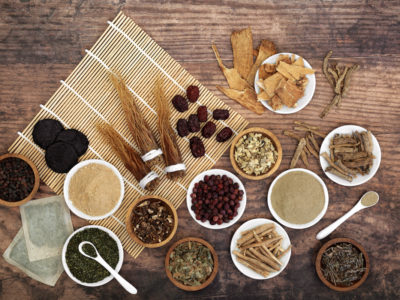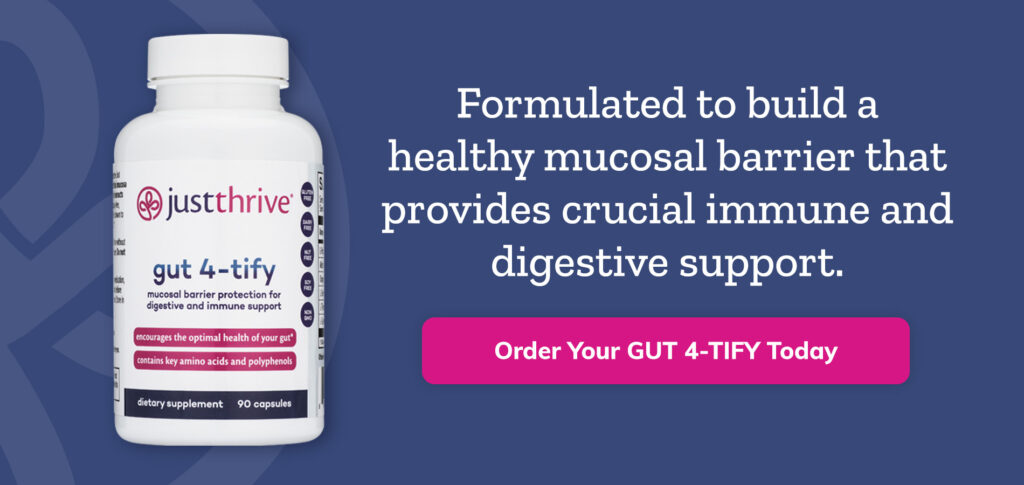Table of Contents[Hide][Show]
Chances are, the importance of a healthy gut is on your radar.
Scientists and progressive physicians have strongly pointed to the gut and digestive tract as being THE key to optimal health in every part of our bodies (including our mental health.)
The term “gut” refers to the group of organs responsible for helping your body digest and use the food you eat. This includes your:
- Stomach
- Small intestine
- Large intestine
Interestingly, there’s a crucial component protecting these organs, keeping them and your entire digestive system healthy…and it’s probably not what you think.
We’re talking about mucus.
Your mucosa (aka: the mucosal system) covers a huge surface area in your body (150 times bigger than your skin) and our immune system depends on it to function at its best.
So in this article, we’re going to “meet” the mucus in your stomach and discover how to support it better.
Your immune system and digestion will thank you.
What is stomach mucus and what is its function?
Let’s start with the basics: what exactly is mucus?
The substance itself is defined as “a viscous, slimy mixture of water, electrolytes, epithelial cells, and white blood cells secreted by various glands with the goal of lubricating and protecting certain areas of the body.”
Mucus found in the stomach, specifically, is a viscous liquid that’s made with two goals:
- Lubricate the food you’ve eaten to begin the process of digestion
- Protect your internal organs from potential damage caused by things you’ve consumed or the acid inside of the stomach. This protection exists inside of the stomach as well as outside of it.
In short, mucus is produced by the body in areas that need protection or “padding” from other factors.
These “other factors” could be internal or external threats. An example of an internal threat would be pathogens locked safely inside the stomach. An external threat would be accidentally consuming a virus or toxin.
How stomach mucus boosts your immunity
When you hear the word “mucus,” you probably don’t think of it as a good thing.
The only time we really have to deal with it outside of our body is when we’re sick, and it just seems like such a nuisance that there’s no way it could be beneficial.
But in fact, the reason you get a runny nose is because your body is using mucus to fight off whatever bacteria or virus you picked up. Grabbing for a tissue is a great sign that your body is getting the bad guys out of your system.
Your entire immune system leans heavily on mucus to target and eliminate disease-causing pathogens and other invaders.
When a threat is perceived anywhere along the digestive tract, your body will send mucus to surround and (hopefully) prevent it from infecting you.
There are several types of mucus molecules, but the most common one is called mucin-2.
Mucin-2 is created by bacteria in the stomach, and is located closer to the skin surrounding the stomach. It’s the main component of mucus that aids in the ability to “trap” invading pathogens.
Beyond just isolating the threat, mucus also allows cells to communicate with each other more effectively, which makes for fast prevention of infection from something you don’t want to catch.
This cell communication is made possible with several other mucin-types that, unlike mucin-2, can extend further from the skin of the stomach.
This allows these mucins to be “bridges” between the skin of the stomach, the mucosal lining itself, and the things inside or outside of the stomach.
Because these mucins can extend so far, the cells in each of those areas – stomach, mucosal lining, inside or outside of the stomach – use them to communicate with different areas of the system.
Long story short: by having a healthy mucosal barrier, you’re creating a system in your body that targets and neutralizes most potentially harmful substances before they can ever take you down.
Related
3 Common Health Issues You Had No Idea Were Gut-Related
Explore three common issues that may turn out to be gut-related and that could actually be helped by be balancing your microbiome.
How stomach mucus protects your gut from itself
Stomach mucus is used as a part of the body’s sickness prevention protocol, but it’s also used to prevent damage to your organs from the stomach’s own acid.
Our bodies are more complex than we typically give them credit for.
For reference: the blood’s natural pH is around 7.4. This is just above neutral and considered slightly alkaline. Most of the body seems to hang right around this pH, too.
In the stomach, it’s a different story.
The parietal cells are a type of epithelial (skin) cell within the stomach lining that create and secrete stomach acid. But not all epithelial cells can withstand the pH of stomach acid, which sits at around a 2 (very acidic) on the pH scale.
And since the stomach organ is made up of several types of epithelial cells, the body needs a way to defend itself against its own acid.
That’s where stomach mucus comes in.
It basically protects the stomach from itself as well as outside pathogens.
So, when you eat, both mucus and stomach acid are necessary to get those nutrients broken down and sent to the intestines, and eventually your blood, for delivery to your cells.
Otherwise, the extreme pH of the stomach acid would destroy the stomach itself and you wouldn’t survive much longer.
What is the mucosal lining of your stomach?
The phrase “mucosal lining” refers to the protective layer of stomach mucus.
Your mucosal lining is actually made up of two layers, one that is attached to the stomach lining and one that is not:
- Detached – The layer that comes in direct contact with the stomach acid, contains a viscous alkaline fluid.
- Attached – The layer closest to the stomach lining that cannot be removed. It contains a protective carbohydrate called sucralfate.
Since the stomach acid is so acidic, the detached layer of the mucosal lining protects the stomach by essentially “balancing out” the stomach acid’s pH before it gets near the edges of the stomach.
The attached layer contains a sugar chain called sucralfate. This sugar is used as a protective barrier to protect the mucosal lining’s integrity.
In places where ulcers in the stomach begin to form, sucralfate reacts with the stomach acid to form a protective gel that sticks to the ulcers and other epithelial cells needing protection.
Between these two layers of the mucosal lining, the stomach can properly and safely digest food.
Can the stomach’s mucosal lining be damaged?
Even though the stomach mucosal lining is built to protect the stomach, the mucosal lining itself is vulnerable to damage as we age.
But beyond that, lifestyle and environmental factors play a large role in the health of your mucus, too.
Damage to the mucosal lining is called gastritis. Gastritis can be acute (meaning that it’s sudden and short-lived) or chronic (long-term,) and there are two ways it can manifest:
- Erosive (the most common)
- Non-erosive
Erosive gastritis is signified with both inflammation and wearing away of parts of the mucosal lining, whereas non-erosive is inflammation without wearing away of the mucosal lining.
An inflamed mucosal lining can lead to painful digestion, improper digestion, and can cause food intolerances.
And erosion of the mucosal lining means that it’s literally wearing away – leading to less protection for your stomach and other gut organs.
Some of the most common causes of gastritis are:
- Taking nonsteroidal anti-inflammatory drugs (NSAIDs), especially chronically
- Taking corticosteroids, especially chronically
- Alcohol abuse
- Fatty, processed, or acidic foods
- Too much caffeine
- Bile reflux complications
- Bacterial infection (typically from H. Pylori)
- High levels of stress
- Autoimmune disease
Related
10 Best Herbs for Energy and Vitality
Feeling more lethargic than usual? These ten herbs for energy and vitality will help you cope with stress better, beat fatigue, and get sleep.
How to keep your stomach mucosal lining healthy
There are a number of easy things you can do today to prevent damage to your mucosal lining.
Avoiding high doses of NSAIDs and corticosteroids, as well as keeping alcohol intake down, are two actions you can begin considering if these apply to you.
If you feel that you’re overwhelmed often, start creating ways to relax more in your life. Meditation, journaling, and breathing exercises are all great options for this.
When it comes to diet, a few key mucosal lining helpers are:
- Foods rich in antioxidants, such as berries, dark leafy greens, dark chocolate
- Foods rich in polyphenols, found in most plants (veggies, fruits, spices)
- Cutting back on processed foods (which are typically acidic)
- These 4 key amino acids:
- L-proline
- L-serine
- L-cysteine
- L-threonine
These specific amino acids are important for the creation of mucin2, the main mucus molecule mentioned earlier that helps “engulf” pathogens trying to invade your body.
Here’s our favorite supplement with all 4 of them.
Mucus: your body’s secret weapon
So, what does the stomach mucus do?
It aids in digestion by lubricating your food before it moves into the intestine.
Stomach mucus protects the stomach from its own acid. It also helps to heal itself and the stomach if the first layer of the mucosal lining is breached.
And it even prevents disease by encasing bacterial and viral threats before they can multiply.
Stomach mucus might not be the first thing you consider when you’re trying to be healthy.
However, it’s an important aspect of maintaining a strong immune system, properly digesting food, and allowing you to live a life with the most optimal health possible.
You May Also Like…






